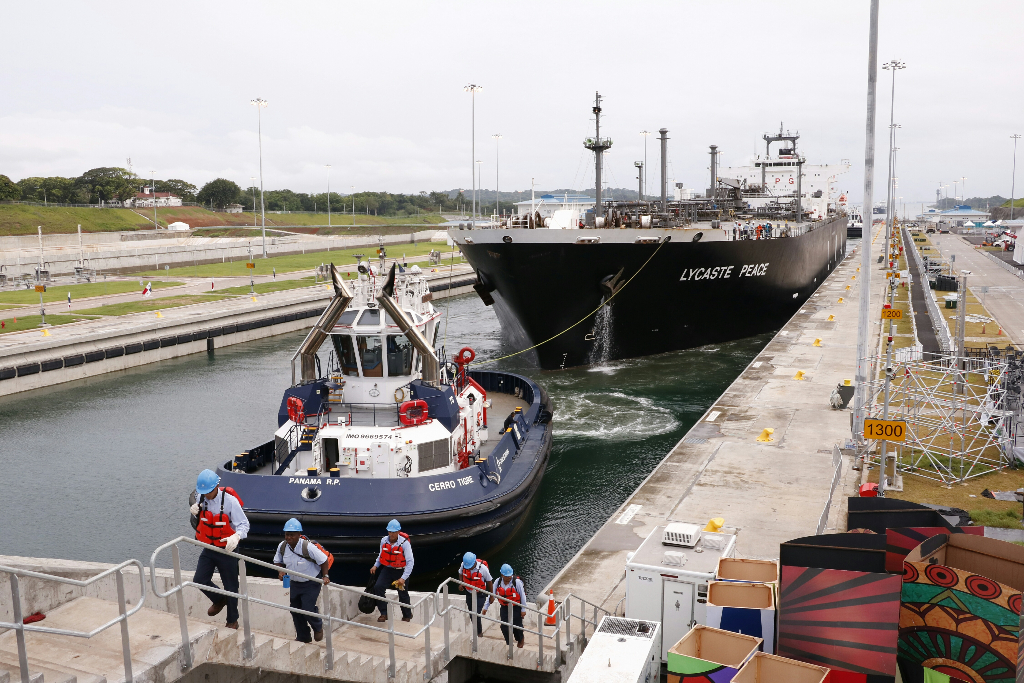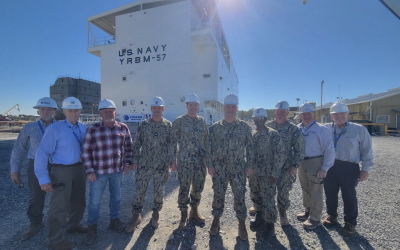U.S. and international maritime labor groups are protesting a move by the Panama Canal Authority to discipline 22 canal tugboat captains who complained that short staffing has increased danger to crews.
Widening canal locks to accommodate larger containerships and liquefied natural gas tankers also led to replacing “mule” locomotives that towed vessels through the original locks.
Now a pair of 95'x44' azimuth tractor tugs assist during each locking. The tugb captains, members of the Union de Capitates y Oficiales de Cubierta, say the canal authority unilaterally decided to reduce crew size from three deckhands down to two, and set daily shifts that exceed 12 to 14 hours.
In an April 12 job action, the captains refused to work until the authority addressed their concerns, leading to the threat of losing their jobs.
Canal authority officials pushed back hard. In a statement promising to discipline tug operators, the authority asserted the their job action posed an economic threat to the nation.
“The decision is based on the fact that these tugboat captains refused to fulfill their duty of assisting the transit of vessels through the neo-Panamax locks, which affected the regular operation and caused a negative economic impact on the country as it affected the confidence of our clients and the image of the Panama Canal.”
Canal officials maintain the operational plan was to use three deckhands for each tug to work with the new locks, then go to two crewmen as operators gained experience.
Last week the Panama government’s ethics and accountability agency, the Autoridad Nacional de Transparencia Internacional, said it is investigating the canal authority’s action against the captains.
“This is a very complex operation, shoehorning large ships into a small space with little margin,” said Capt. Don Marcus, President of the International Organization of Masters, Mates & Pilots, in a statement supporting the canal captains. “This was dangerous work before ACP lowered standards. Long hours combined with fewer crewmembers, using underpowered tugs, is making a bad situation worse.” The UCOC is an affiliate of the U.S.-based International Organization of Masters, Mates & Pilots.
The $5 billion expansion and widening of canal locks included constructing the new fleet of assist and escort tugs. The new locks opened to much fanfare in June 2016, but delays, cost overruns and accidents have raised persistent questions in Panama and the shipping industry.
Labor advocates recall two 2017 incidents as harbingers of trouble.
During a transit in April 2017 a U.S. Coast Guard cutter, the 270’x38’x14.5’ Tampa, collided with the canal tugboat Cerro Santiago. Investigators from the U.S. National Transportation Safety Board cited overwork and "the failure of the master of the Cerro Santiago to maintain a vigilant watch due to fatigue."
In November 2017, Osvaldo de la Espada, a canal worker with 24 years experience, died from head injuries suffered during a line-handling incident at the renovated Agua Clara locks.
“The Panama Canal Authority spent billions to expand the Canal but has failed to hire the necessary number of people and buy the equipment they need to run it properly,” said Marcus. “If you don’t have enough hands on deck, you are putting lives at risk.”
The International Transport Workers Federation called on the authority and the government of Panama to protect worker safety, and filed a complaint with the International Labour Organization, a United Nations agency. The U.S.-based Maritime Labor Alliance, a consortium of unions representing deck officers, engineers and Panama Canal ship pilots, likewise called for a response to the tug captains’ concerns.





